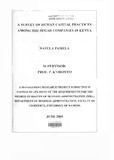| dc.description.abstract | The purpose of this study was to determine human capital management practices
among the sugar companies in Kenya and the challenges that the sugar companies face
while implementing these human capital practices. The population of this study consisted
of all the human resource managers and the employees in the human resource
departments of the seven sugar factories currently operating in Kenya. The sample used
consisted of all the human resources managers and five employees from each of the
human resources departments in the sugar companies. The data was collected using a
structured survey questionnaire that was personally administered by the researcher to the
human resources managers and other personnel in the human resources departments of
each of the sugar companies. The response rate was 80%. Out of the seven operational
sugar companies, only five responded to the questionnaire. Descriptive statistics such as
frequencies, mean, standard deviation, and percentages were used to analyze the data
The data was then presented in tabular form and narratives.
Results indicate that 40.6% of the sugar companies practice human capital
management to a large extent, 12.5% are moderate in their practices and 46.9% do not
practice human capital management. However, majority of the companies have
implemented practices such as having training and development that are based on
improving the performance of the employees and training and developing employees who
perform well and those employees who are in core positions. This is important as it
enables the companies to manage their employees better by looking at the value that each
individual employee adds to the organization for competitive advantage. Having training
and development opportunities for employees that perform well and those in core
positions adds value to the organizations and motivates the employees in those positions
to work towards achieving the organizations objectives. The research findings also
indicated that the sugar companies hardly engaged in practices like having different
salaries for employees in similar positions, temporary wage freezes, golden handshakes
and in-house job matching for retrenched employees and offering individual choices in
the employee benefit systems among others. This is likely to impact negatively on
productivity. In a competitive world, organizations strive to keep the best employees who
are committed and engaged in their jobs. Without offering the interests of the employees
at work, the companies could compromise the performance of their employees and their
competitive advantage. | en |

